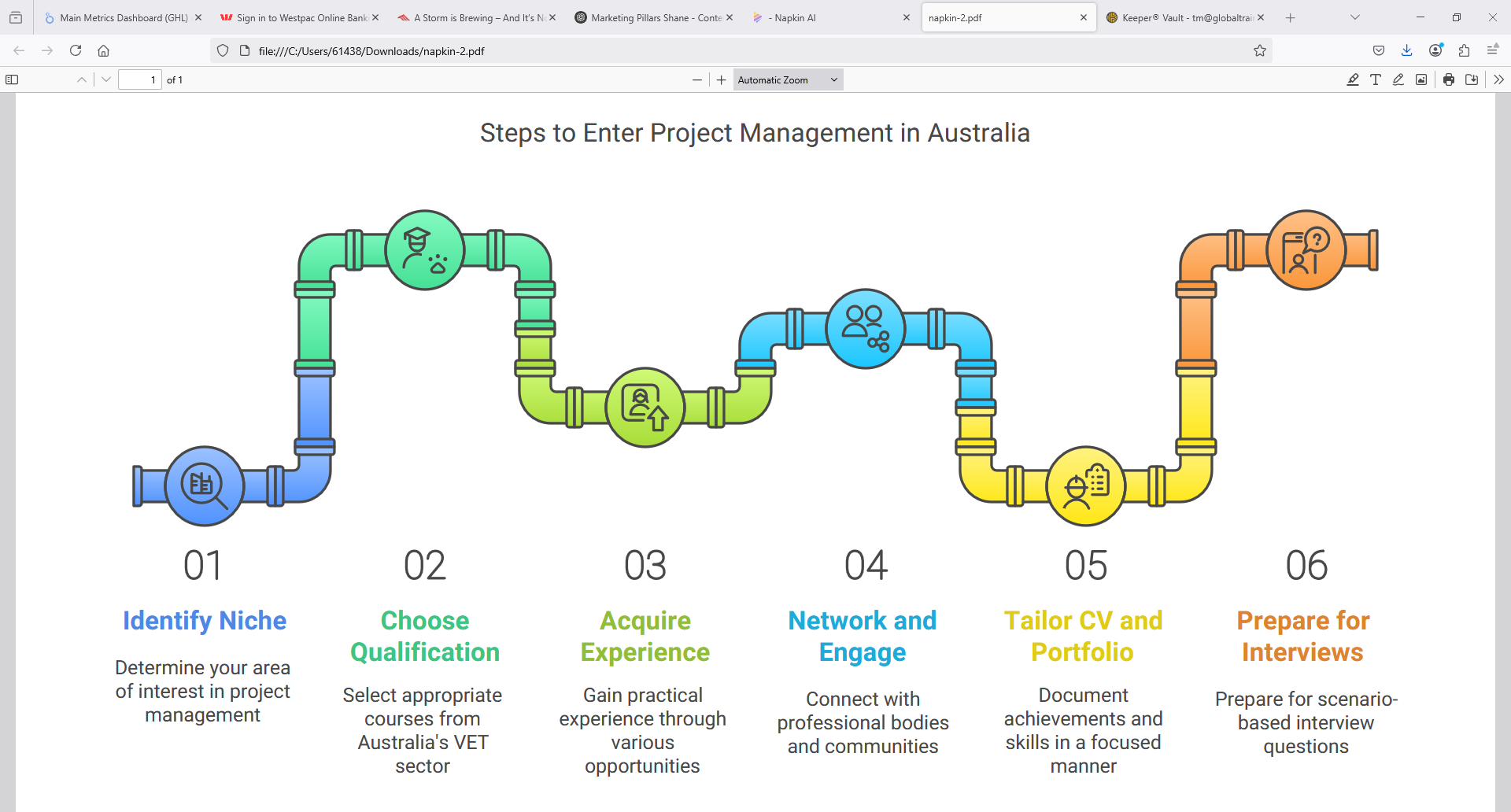When people consider a new profession or an educational program, a practical question often arises: "Will this career pay well?" In Australia, project managers enjoy a reputation for earning above-average salaries, particularly in fields that rely on complex coordination. This article delves into the financial side of project management, examining median wages, key industry variations, and the potential salary uplift from formal qualifications.
For an overall discussion of whether project management is worth your time and money, refer back to our supporting article, "Is a Project Management Qualification Worth It in Australia?" If you'd like a deeper look at the intangible rewards of a project management career, see "Is It Worth Studying Project Management?" in this same series.

Typical Salary Ranges by Experience Level
According to recent data from the Australian Bureau of Statistics (ABS) and job market analysts:
Entry-Level Roles
Project Coordinator or Junior Project Manager positions might start around AUD 60,000 to AUD 75,000 per year, particularly in smaller companies or less specialised fields.
Mid-Level Project Managers
Salaries typically fall in the AUD 90,000 to AUD 120,000 range, which is already above the national median.
Senior or Specialist Roles
Project leads in sectors like IT, construction, or engineering can earn between AUD 120,000 and AUD 150,000, or even higher if they oversee large-scale initiatives.
Besides base pay, some organisations offer bonuses tied to project performance. Delivering under budget, meeting critical deadlines, or achieving high client satisfaction can trigger financial incentives, bumping up overall compensation.
The Impact of Qualifications
While industry experience remains a critical factor, having credentials such as the BSB40920 Certificate IV or BSB50820 Diploma in Project Management can open doors to higher-paying roles. Certain government agencies, large corporations, and international firms specifically mention these qualifications in job listings, signalling that formal training is non-negotiable for certain positions. As a result, professionals who invest in upskilling often find themselves on a faster trajectory for promotions and pay raises.
A PMI (Project Management Institute) survey has suggested that globally, certified project managers tend to earn around 20% more than their non-certified counterparts, although exact figures in Australia can vary. The principle remains: qualifications add to your credibility, which can lead to better earnings over time.
Industry Variations
Compensation can vary dramatically by sector:
Information Technology
Complex software or infrastructure projects command substantial budgets, allowing experienced project managers to earn six-figure salaries.
Construction and Engineering
Large-scale construction projects often come with robust compensation packages, reflecting the high stakes and technical demands of the role.
Finance and Consulting
Corporate project managers dealing with regulatory changes or strategic transformations can also earn well, particularly if they handle multi-year, high-budget programs.
Non-Profit or Government
While salaries might be more moderate, job stability and benefits can offset slightly lower compensation. Government roles can still be quite lucrative, especially at higher levels.
Career Progression and Earnings Growth
One appealing aspect of project management is its scalability. As you gain experience and perhaps pursue additional qualifications—like agile certifications or higher-level degrees—your earning potential can climb significantly. For instance, a mid-level project manager who masters emerging methodologies such as Scrum or Kanban may secure better-paying roles in tech startups or established corporations looking to modernise their processes.
Furthermore, project managers can evolve into program managers or portfolio managers, overseeing multiple projects and steering organisational strategies. These leadership positions can push compensation into the upper ranges, often accompanied by executive-level perks or profit-sharing arrangements.
Work-Life Balance Considerations
While project management can indeed be "good money," the profession also involves pressure: tight deadlines, budget constraints, and the responsibility of coordinating diverse stakeholders. Some individuals thrive under these conditions, while others may find the stress challenging. Considering job satisfaction alongside salary is crucial. A high income may lose its allure if the role consistently leads to burnout or conflicts with your preferred work-life balance.
For a deeper exploration of whether the overall investment of time and resources is worthwhile, see the main article, "Is a Project Management Qualification Worth It in Australia?" If you're intrigued by broader career trajectories, check out "How to Get into Project Management in Australia?" or the main pillar piece, "Project Management Qualifications: Which Is the Right One for Your Career Path?"
Conclusion
Project management often lives up to its reputation as a lucrative career choice in Australia, with many professionals surpassing the national median income. Credentials can enhance earning potential, but real-world experience, problem-solving prowess, and the ability to deliver results under pressure also play key roles in pushing salaries higher. Balancing these factors—and ensuring the role aligns with your personal goals—remains essential to truly making project management "good money" for you.